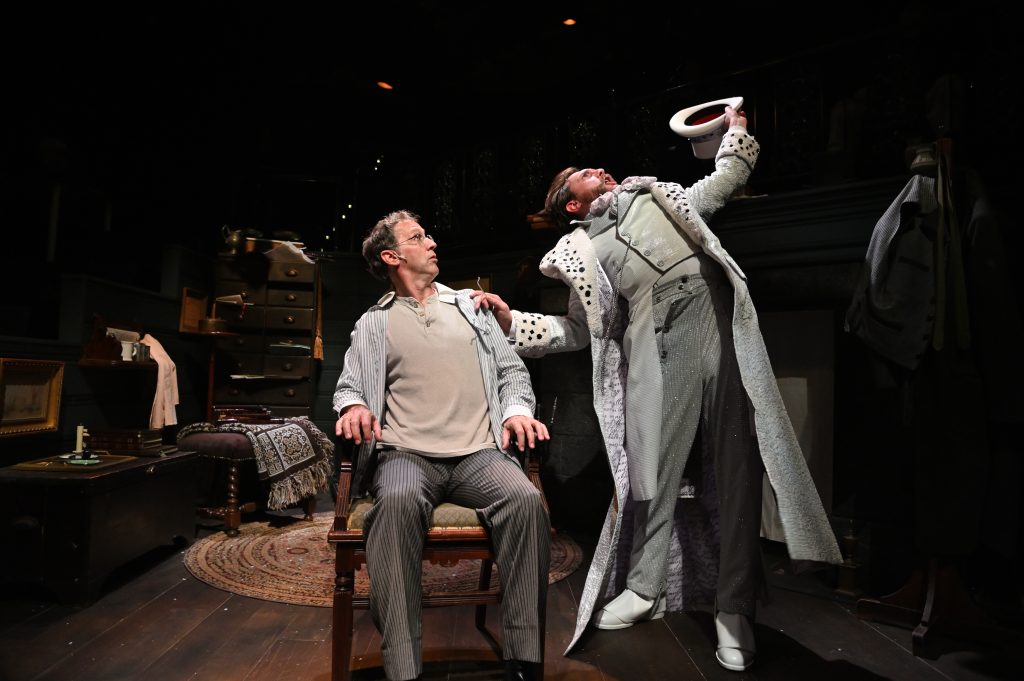
Charles Dickens’ play A Christmas Carol was so popular in London in 1843, the year the novella on which it was based was released, that there were eight stage productions playing concurrently by Christmas Eve.
His play is popular still if the nearly two million people who have seen the annual holiday classic at Trinity Repertory Company these past 47 years – including an online version streamed during the coronavirus pandemic of 2020 – is any indication.
You know the story. Set in mid-19th century London, A Christmas Carol is a morality tale about Ebenezer Scrooge’s one-night transformation from malevolent miser to charitable cherub. After revisiting the lost opportunities of Christmas past, witnessing the wasted potential of Christmas present, and foreseeing the impending horrors of Christmas future, Scrooge’s spirit is rejuvenated, his relationships with his family and the family of his overworked employee Bob Cratchit are repaired, and his soul is salvaged. God bless us, everyone.
What makes the Trinity Rep production unique is that each year it is reimagined by a new director, designers, and cast members. Last year, Scrooge and his dead-as-a-doornail business partner Jacob Marley were portrayed by women, the Cratchit family was Hispanic, and Scrooge’s nephew Fred was gay. The drab, sparse scenic design that represented repression early in the production became bright and rich as Scrooge began to soften. “The end result,” noted Motif critic Susan McDonald, was “an infusion of great depth and relatability.”
This year’s production has its share of color- and gender-blind casting (the abundantly talented Alison Russo, for instance, plays Fred). But the most prominent innovation is the infusion of humor into the storytelling. Dickens’ script contains some clever wordplay, but in the hands of director Stephen Thorne, there are well-earned laugh-out-loud moments. Most come courtesy of the hilarious Jeff Church, whose meta-theatrical Ghost of Christmas Past plays his scene as if he is playing a scene by calling out sound and light cues, narrating the story’s subtext, and correcting Scrooge’s line reading. Taavon Gamble in over-the-top drag is brilliant as the Ghost of Christmas Present. His delightful flamboyance and funny one-liners stupefy Scrooge and engage the audience, so much so that we are blindsided by the tragedy we know is coming.
This production also leans into the carol in the play’s title by having wonderful musicians (conductor Michael Rice on keyboard, Bill Buonocore on guitar, Anne Kelton and Richard Marchetti playing woodwinds, Ethan Wood on violin, and Mike Sartini on percussion) on stage underscoring dialogue and introducing original music by Richard Cumming, the former composer-in-residence at Trinity Rep. There’s an extended dance break during the party scene at Fezziwig’s (an enchanting Richard Donelly) with period choreography by yaTande Whitney V. Hunter and, at Fred’s house, a standalone song surfaces that could well have remained seated.
While innovation has its place, the true litmus test for a good A Christmas Carol – and perhaps the very thing that brings audiences back year after year – is a proper rendering of what Dickens himself brings to the table.
He brings us Victorian London, and a good production needs to temporarily transport us there.
Michael McGarty (set design), James Horban (lighting design), and Peter Sasha Hurowitz (sound design) join forces to effectively create an in-the-round performance space that feels cold, foreboding, and 19th century industrial. Gas lanterns light the way to Scrooge’s dark dwelling in a small section of the stage. Toni Spadafora-Sadler’s period-specific and character-defining costumes are spot-on. Victorian London: check.
“Mankind was my business,” says Marley (Rodney Witherspoon II) early in the play in an effort to show Scrooge – and by extension, us – the error of our ways in our treatment of those in need. A good A Christmas Carol should nudge our social conscience and kickstart our Christmas spirit.
Trinity Rep peppers its production with young performers from across southern New England, who do much of the heavy listing in this regard. On the night of my attendance, the adorable 9-year-old Lou Ella Wechsler (Tiverton, RI) lights up the stage as the angel who pulls Scrooge out from his Christmas-future grave while delivering a wonderfully sardonic grin. Endearing 11-year-old Lily Altomari (Rumford, RI) perfectly plays the neighborhood kid who brings the reformed Scrooge a Christmas goose. They are surrounded and supported by a stellar, all-in ensemble. Christmas spirit: check
Dickens also delivers a snarling, shouting, sadistic lead character, gives him a world-class catchphrase (“Bah. Humbug!”), and then turns him into “as good a friend, as good a master, and as good a man, as the good old city knew.”
This production has found a marvelous Scrooge in Mauro Hantman, a veteran of 16 other Trinity Rep A Christmas Carols and a former Scrooge from the 2010 staging. His performance as the troubled soul is laden with pathos and his transformation is brimming with exuberant, infectious joy. Solid Scrooge: Check.
Clearly, Trinity Rep’s A Christmas Carol is a gift that keeps on giving. Audiences should most certainly keep on going.
A Christmas Carol runs through Dec. 31 at Trinity Rep, 201 Washington St., Providence. Contact trinityrep.com or call (401) 351-4242.
Bob Abelman is an award-winning theater critic who formerly wrote for the Austin Chronicle.